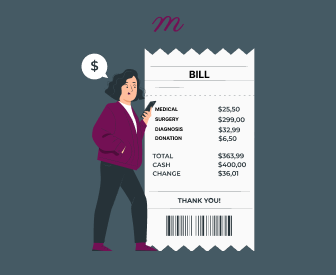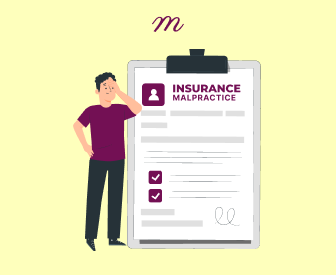Have your progress notes written for you automatically
Have you been considering starting a private practice, but not sure how to start? Have you started a private practice and are having difficulty with the billing process? Do you have fears about handling the billing process or not being able to pay someone to handle it for you? Then you have come to the right place!
I am an experienced Licensed Clinical Social Worker and have been a therapist for roughly 10 years. I have practiced in community mental health settings and am new to starting private practice. Today I will be sharing practical advice that helped me take the leap into starting a private practice.
If you are a therapist or counselor of any sort you already know that building a client caseload is pivotal in having a successful private practice, but effectively handling the billing of those clients is just as crucial. Yes billing, which means paperwork, I'm sure that's the last thing you want to deal with as a therapist. However, don't allow the "what if's" and unknowns of presumed complicated billing paperwork stop you. I have gathered 5 tips that will increase your knowledge and confidence with starting your own successful private practice!
- Decide between cash pay, insurance payment, or a hybrid of the two.
What type of billing process and payment system would you like to start with in private practice? This can be a difficult decision, but it needs to be chosen while organizing your private practice business plan. Many therapists, myself included, start their private practice with strictly cash pay because there are a lot of benefits. Some therapists choose to accept select insurance providers as well as cash payments because this can be advantageous for both the client and therapist.
What are the benefits of cash pay only? The biggest advantage is that you don't have to deal with complicated insurance paperwork, credentialing, and waiting to receive payment from an insurance company. Cash pay is essentially streamlined. You provide the service, and that service is paid for immediately. You can even set up a payment at the time of service policy, which I would highly recommend.
There are no delays in payment from the insurance companies, you don't have to meet specific diagnoses in order to get payment, and you don't run the risk of an insurance company denying a claim for therapeutic services. Also, have you been through the credentialing process? What a nightmare it can be! It is quite extensive, complicated, and stressful to do on your own. It can also delay startup of your private practice if the majority of your clients are covered by insurance. You already have enough paperwork and stress as therapists right? So, those things are important to consider when first starting your private practice.
Even with the added paperwork stress some clinicians decide to start out accepting certain insurance providers for payment as well as cash self pay. It can be beneficial because it creates a larger pool of possible clientele, and for some clients this option won't add financial costs for them. A hybrid model accepting both would ultimately open your private practice up to a wide range of clients, and pay sources.
Also, if you have already been credentialed with insurance companies then it can be a less complicated and lengthy process. Especially if you have kept your Council for Affordable Quality Healthcare (CAQH) login information. Every licensed therapist that has been credentialed with any insurance company will have a CAQH login and profile. If you’re not sure where to find this information and have worked for a counseling center the billing/credentialing specialist at that center will have a record of that information. Always keep that login information with you no matter what direction you go in the therapy career world.
Each therapist may approach this area differently, and it's important to weigh out the pros and cons of each pay source with consideration of what you feel most comfortable with. My personal advice, start out using the cash self pay model and if you're wanting to add in accepting insurance payments do so slowly after your practice is well established with a strong financial foundation.
- Do your research for session pricing!
Again, whether you are accepting insurance payments, cash payments, or both you will need to research how much the most commonly used insurance companies in your area are reimbursing for session costs. You also need to research how much therapists in your area are charging for different types of sessions. You want to make sure you're not charging too excessively, but you're also charging enough to make a profit of course! Also, if you are charging more than what an insurance company is reimbursing for that service then this will mean the client is responsible for the remaining amount with a copay.
Clients may not be okay with this, and you run the risk of losing clients based on having a copay after insurance coverage. This can be very difficult to find that balance of fair pricing for the client that is also lucrative for you. So again, do your research of how much sessions cost in your area. Look up counseling centers or private therapists in your area by a simple online search.
Many counseling centers and private therapists list their session prices on their websites. It's also a good idea to contact the most commonly used insurance providers in your area to get a list of what therapeutic services they reimburse for and the pricing for each. If you're considering having any insurance payments at all, even with a hybrid model do your research!
If you are starting out with cash self pay only you have more flexibility in setting competitive rates, and can get creative with packages you offer, or subscriptions for clients. In my private practice I offer packages with a rewards program to clients who pay for a monthly membership. For example, their single session prices are slightly cheaper if they choose to have a membership, they get various personal meditations or workbook sets provided to them with the membership, and free access to extra workshops or groups that I provide.
I have found this to be successful financially, less stressful for me billing wise, and my clients have really enjoyed this model. A self pay only model allows a lot more creativity and individualized treatments which has been fabulous for me!
- Keep complete and organized records.
If you've ever worked in a community mental health setting or non-profit agency the concept of keeping detailed, organized records isn't foreign to you. You may not need to keep the same comprehensive records as a community mental health center in your private practice, but you still need certain records of client information and tracking of services provided. It is important to document who is on your client caseload, and keep an individual file for each client. I encourage keeping both written files as well as electronic files.
Make sure you keep a written document as well as an electronic file of the date and time a client was seen, and when/if the session was paid for. A simple electronic way of keeping track of this is using Microsoft Excel or a similar program. If you are accepting insurance payments you need to keep invoices of the services with the date, time, and service provided for the client to submit to insurance. If you can afford it, there are electronic health record systems that assist with documentation and submitting claims to insurance.
Also, if you are working with insurance companies for reimbursement it is vital to keep detailed notes of sessions, prognosis, and supporting documents of the client's diagnosis. You need these to prove to the insurance company that it is medically necessary to have the sessions so that they will approve and reimburse the claims. If you don't have these records it increases the likelihood that an insurance company will decline payment to you for the services you provide. Nobody wants that!
Another important type of record to keep on file, and require clients to sign is an agreement to payment or billing policies. Such as; if payment for the session is due at the time of service, how long someone has to pay an outstanding invoice, if there are no show or late cancellation fees, and the terms of any monthly membership charges, or when in the month the client is expected to pay their membership. These types of payment or billing policies are important to think about and have in place to be signed during the very first session with a client.
Whether you are going with a self cash pay model or insurance reimbursement model keep sufficient records. Insurance reimbursement requires you to have more detailed records in order to get paid. Regardless, keeping organized records will help your private practice billing run smoothly and ethically.
- Know what payment forms you will accept right away.
Even if you decide to go with insurance payments or a hybrid model you need to set up how and where you will receive payments because there may be co-pays or services that aren't necessarily covered by insurance. Whether you go to a doctor, cosmetologist, massage therapist, chiropractor, or any private practitioner they all vary in what types of payment they accept. Some only accept cash or checks, and more recently a lot of small businesses have moved to accepting PayPal, Venmo, or similar types of online payment systems.
Technology has also made it a little easier to get set up to receive debit or credit card payments. However, this option may add to your private practice costs. In my experience, I would start off with accepting payments that won't cost you at all. Cash, check, and online payment systems are free options that are easy to navigate. Online payment systems also keep record of every payment received which can be a helpful backup for concise record keeping.
Additionally, I would also recommend establishing a separate business bank account from your personal bank account. This way, any cash or check payments received, or any online payment systems go into a separate business bank account. The separation from a personal account helps keep things organized and structured come tax season.
This will also help in consistently paying yourself a portion each month from your business account to your personal account. A separate business account allows you to pay for anything private practice related. Then you have proof of money coming into only your business and money coming out for business purposes. Perfect plan for business audits or tax time!
- Budget for an accountant and keep receipts of EVERYTHING.
When first starting out in private practice, it's important to budget for hiring an accountant during tax season. Navigating small business taxes on top of the typical taxes you face each year can be extremely complicated, especially when your private practice is new.
You don't necessarily need to hire a full time accountant or billing specialist for your practice at first, but you need to plan for how much it will cost to hire a contract accountant to assist you with filing your taxes properly. Trust me it is worth the cost of paying an accountant to help you navigate small business and/or private practice taxes. It may save you from costly mistakes or additional tax fees. There are certain tax forms that are required and of course there is guidance that an experienced accountant can offer that will ease a little stress during tax season.
Again, keep records and receipts of EVERYTHING that is connected to your private practice. This way you have receipts and documented proof for tax write offs, and we all know you can use every tax break you can find sometimes!
These tips are what helped me to just finally go for it with private practice. Information is power, and the more research you do on what has worked best for others in their private practice, the more successful your practice will be. Using the above information I have not only started my private practice, but it is successful and growing every day. I hope you find the information just as beneficial as I did, and good luck! I’m always finding creative ways to grow my business so be on the lookout for more helpful articles on private practice or treatment interventions.










